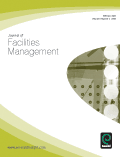
Journal of Facilities Management
Scope & Guideline
Connecting Theory and Practice in Facilities Management
Introduction
Aims and Scopes
- Facilities Management Strategies:
Investigates various strategies employed in facilities management across different sectors, with a focus on optimizing performance, sustainability, and user satisfaction. - Impact of Technology on Facilities Management:
Explores the role of emerging technologies, such as Building Information Modeling (BIM), blockchain, and IoT, in enhancing facilities management practices and decision-making. - Sustainability and Environmental Considerations:
Examines sustainable practices in facilities management, including energy efficiency, green building initiatives, and environmental impacts, particularly in the context of developing countries. - Public-Private Partnerships (PPPs):
Analyzes the dynamics and effectiveness of public-private partnerships in the management of facilities, particularly in infrastructure and healthcare sectors. - Health and Safety in Facilities Management:
Focuses on health and safety measures within facilities, including risk assessments and management practices to ensure safe environments for users. - User Experience and Satisfaction:
Studies the perceptions and satisfaction levels of users in various facilities, emphasizing the importance of occupant experience in facilities management.
Trending and Emerging
- Sustainable Facilities Management:
An increasing number of studies are emphasizing sustainability in facilities management, exploring green practices and initiatives that align with global sustainability goals. - Integration of Smart Technologies:
There is a growing trend towards the integration of smart technologies such as IoT and AI in facilities management, reflecting the industry's shift towards digital transformation and efficiency. - Impact of COVID-19 on Facilities Management:
Research analyzing the implications of the COVID-19 pandemic on facilities management practices, including changes in workspace utilization and safety protocols, has become increasingly relevant. - User-Centric Design and Experience:
A notable trend is the focus on user-centric design principles in facilities management, highlighting the importance of occupant satisfaction and experience in facility planning and operation. - Public-Private Partnerships in Facilities Management:
The role of public-private partnerships is gaining traction, particularly in developing countries, as a viable strategy for enhancing facilities management in critical sectors such as healthcare and infrastructure.
Declining or Waning
- Traditional Facilities Management Practices:
There has been a noticeable decrease in publications focused solely on traditional facilities management practices, as the field increasingly embraces technological advancements and innovative approaches. - General Maintenance Strategies:
Research addressing general maintenance strategies without a specific focus on sustainability or technology has diminished, reflecting a growing preference for integrated, technology-driven maintenance solutions. - Cost Management in Facilities Management:
While cost management remains important, there is a decline in papers solely focused on financial aspects, as the field shifts toward broader discussions that include sustainability and user-centric approaches.
Similar Journals
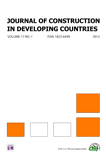
Journal of Construction in Developing Countries
Connecting Ideas, Shaping Futures in ConstructionThe Journal of Construction in Developing Countries, published by Penerbit Universiti Sains Malaysia, stands as a pivotal platform for disseminating vital research in the fields of construction, architecture, and civil engineering within the context of developing nations. With an ISSN of 1823-6499 and an E-ISSN of 1985-8329, this open-access journal has been dedicated to promoting the sharing of knowledge since 2006. Its significant contributions to the literature have earned it a respectable position in various categories as highlighted by its 2023 quartile rankings: Q2 in Architecture and Q3 in Building and Construction, Civil and Structural Engineering, as well as Strategy and Management. Researchers and professionals alike benefit from its expansive reach, as it engages with current challenges and innovations in the construction sector across developing regions. The journal's commitment to accessibility enhances its impact and encourages rigorous scholarly dialogue, making it an essential resource for those looking to navigate the complexities of urban development and infrastructure management.

Construction Innovation-England
Unveiling New Horizons in Construction MethodologiesConstruction Innovation, published by Emerald Group Publishing Ltd, is a prestigious journal dedicated to advancing knowledge in the fields of architecture, building and construction, civil and structural engineering, and computer science. With an impressive Q1 ranking across multiple categories, it holds a significant position in the academic landscape, alongside a strong Scopus ranking that further highlights its impact in engineering disciplines. The journal, bearing the ISSN 1471-4175 and E-ISSN 1477-0857, serves as a critical platform for researchers, practitioners, and students who seek to explore innovative practices and methodologies in construction. Readers can expect rigorous peer-reviewed articles that address contemporary challenges and spearhead innovations within the industry. Since its inception in 2001, Construction Innovation has established itself as a vital resource for the dissemination of knowledge, fostering collaboration and dialogue among professionals committed to shaping the future of construction and engineering practices.

Mining Technology-Transactions of the Institutions of Mining and Metallurgy
Elevating Standards in Mining and MetallurgyMining Technology - Transactions of the Institutions of Mining and Metallurgy, published by SAGE Publications Inc., serves as a pivotal platform for disseminating cutting-edge research in the fields of mining and metallurgy. With an ISSN of 2572-6668 and E-ISSN 2572-6676, this esteemed journal has established a notable presence in the academic community, particularly in Geology (Q2) and Geotechnical Engineering and Engineering Geology (Q3) as of 2023. The journal boasts an impressive Scopus ranking, placing it among the top research outlets in its category with Earth and Planetary Sciences _ Geology ranked #170/321 and Geotechnical Engineering and Engineering Geology at #129/229. While it operates under a traditional access model, its dedication to the advancement of knowledge within the mining sector is evident through its converging themes from 2018 to 2024, emphasizing innovation, sustainability, and safety in mining practices. This journal is essential for researchers, professionals, and students seeking to stay at the forefront of developments in the mining industry.
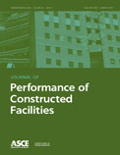
JOURNAL OF PERFORMANCE OF CONSTRUCTED FACILITIES
Enhancing the Reliability of Civil Infrastructure Through ResearchJOURNAL OF PERFORMANCE OF CONSTRUCTED FACILITIES, published by the ASCE-AMERICAN SOCIETY OF CIVIL ENGINEERS, is a leading peer-reviewed journal dedicated to the field of civil engineering with a strong emphasis on the performance assessment and sustainability of constructed facilities. Established in 1987 and converging through 2024, this journal has garnered a solid reputation with an impressive Q2 quartile ranking across key areas including Building and Construction, Civil and Structural Engineering, and Safety, Risk, Reliability and Quality. The journal's Scopus rankings further underline its significance, being positioned within the top percentiles of these domains. As it aims to publish innovative research, case studies, and reviews, the journal serves as a vital resource for professionals and academics who are keen on advancing their understanding of the complexities associated with the performance and reliability of civil infrastructure. Researchers and practitioners interested in the latest advancements in construction performance can greatly benefit from the insights and findings published in this esteemed journal.

Construction Economics and Building
Advancing the Future of Construction EconomicsConstruction Economics and Building is a dynamic Open Access journal published by UNIV TECHNOLOGY, SYDNEY-UTS EPRESS, specifically tailored to address the intersection of construction, economics, and building technology. Established with the aim of advancing research and knowledge in the field, the journal has been openly accessible since 2010, allowing a wide audience of researchers, professionals, and students to engage with high-quality scholarly work. Although its Scopus coverage was discontinued between 2011 and 2014, the journal remains an important resource for those interested in construction economics, providing valuable insights and innovative perspectives on industry challenges and advancements. With a commitment to fostering collaboration and interdisciplinary research, Construction Economics and Building not only enhances academic discourse but also plays a vital role in shaping the future of construction practice and policy.
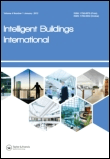
Intelligent Buildings International
Advancing Smart Solutions for Sustainable ArchitectureIntelligent Buildings International, published by Taylor & Francis Ltd, is a premier journal dedicated to advancing knowledge in the interdisciplinary domains of building construction, civil engineering, computer science applications, and planning. Since its inception in 2009, this journal has become a vital resource for researchers, professionals, and students, offering a platform for high-quality scholarly articles that explore innovative strategies and technologies in intelligent building design and efficiencies. With its significant impact factor reflected in its Q2 and Q3 quartile rankings across various related fields, and strong Scopus rankings placing it among the top journals in Geography, Building, and Civil Engineering, Intelligent Buildings International stands out for its commitment to fostering research that enhances the sustainability and functionality of contemporary architectural practices. Readers can access a wealth of articles that illuminate the complexities of smart building technologies and their implications for future construction practices, making it an essential addition to any academic library.
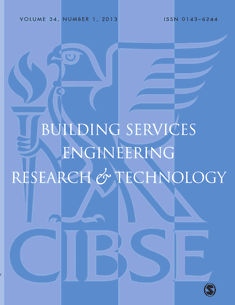
Building Services Engineering Research & Technology
Exploring Cutting-edge Technologies in EngineeringBuilding Services Engineering Research & Technology is a leading journal published by SAGE Publications Ltd, dedicated to advancing the field of building services engineering. With an ISSN of 0143-6244 and an E-ISSN of 1477-0849, the journal has established itself as a vital resource since its inception in 1980, operating as an essential platform for disseminating high-quality research and technological innovations up to 2024. The journal is well-respected within the academic community, reflected in its Q2 category ranking in Building and Construction and a commendable 67th percentile rank among the 223 journals in its field, according to Scopus. Although it does not offer open access, it provides extensive insights and rigorous studies that are invaluable for researchers, practitioners, and students alike. As a central hub for the exploration of cutting-edge methods and principles in building services, the journal aims to foster a better understanding of sustainable and innovative practices within the industry.

Journal of Green Building
Advancing Sustainable Architecture for a Greener TomorrowJournal of Green Building, with its ISSNs 1552-6100 and 1943-4618, is a premier academic journal published by COLLEGE PUBLISHING in the United States. This journal, established in 2006 and continuing through 2024, serves as a vital platform for the dissemination of research on sustainable architecture, building technologies, and environmental design. With its current impact factor signifying a robust academic contribution, it is categorized in Q2 in Architecture and Q3 across several other disciplines, including Building and Construction, Environmental Engineering, and Public Health. The journal’s Scopus rankings demonstrate its strong positioning in the engineering and environmental science communities, making it an essential resource for researchers and professionals aiming to advance knowledge in green building practices. While it is not an Open Access journal, the rich content is pivotal for those involved in the critical intersection of sustainability and construction science. Whether you are a seasoned professional or a dedicated student, the Journal of Green Building offers invaluable insights that drive future innovations in eco-friendly building environments.
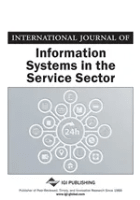
International Journal of Information Systems in the Service Sector
Navigating the Future of Service-Oriented TechnologyInternational Journal of Information Systems in the Service Sector, published by IGI GLOBAL, is a pivotal platform for the dissemination of research and insights within the dynamic field of information systems and service management. With its ISSN 1935-5688 and E-ISSN 1935-5696, this journal serves as a vital resource for scholars and practitioners seeking to advance knowledge from 2009 to 2024. Although the journal is categorized in Q4 across multiple quartiles including Information Systems, Management Information Systems, and Strategy and Management, it consistently attracts a diverse array of submissions that enrich the academic landscape. It is recognized in Scopus rankings across several domains, showcasing its relevance and contribution to the discourse on technology's role in service-oriented sectors. Researchers, professionals, and students can benefit from its rich repository of articles that explore innovative applications and theoretical advancements in service sector information systems, promoting a deeper understanding of evolving technological paradigms. While this journal is not open access, it remains a key publication for those wishing to contribute to or expand their knowledge in this critical area of study.
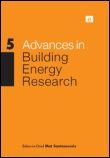
Advances in Building Energy Research
Unlocking Insights in Energy Conservation for ArchitectureAdvances in Building Energy Research is a pivotal journal dedicated to the scholarly exploration of energy efficiency and sustainable practices within the building and construction sector. Published by Taylor & Francis Ltd from the United Kingdom, this journal provides a rich platform for researchers, industry professionals, and students interested in the latest advancements and methodologies that drive energy conservation in architecture and engineering. With an impressive 2023 Scopus ranking of #64 out of 223 in the Building and Construction category and a notable Q2 category quartile, the journal occupies a significant position in its field, emphasizing high-quality, peer-reviewed research that meets the needs of a global audience. Though it operates under a subscription model, its contributions are invaluable for advancing knowledge that addresses the urgent challenges of energy consumption and sustainability in built environments. Spanning research published from 2007 to 2024, this journal continues to be an essential resource for those seeking innovative solutions and insights into building energy performance.